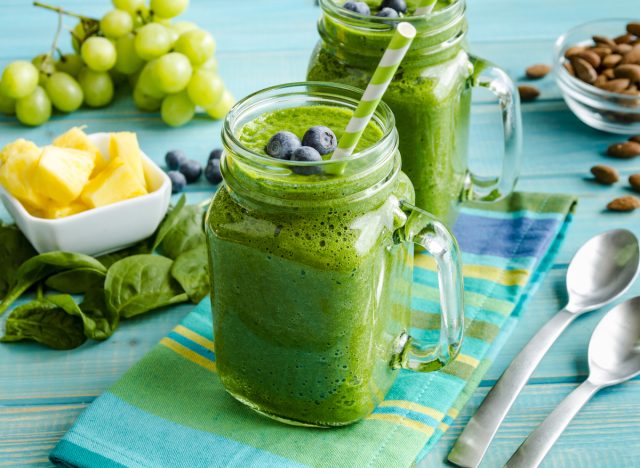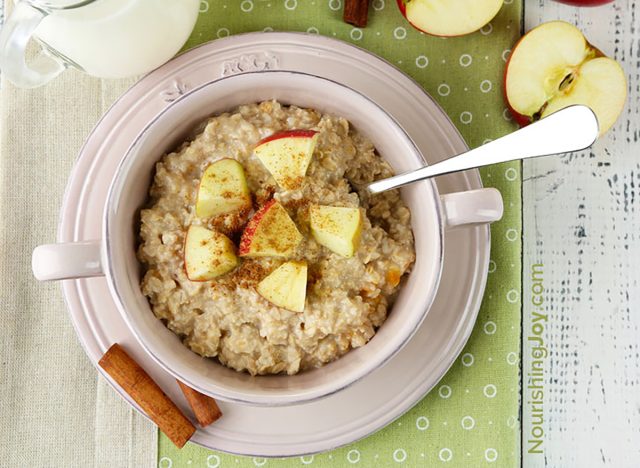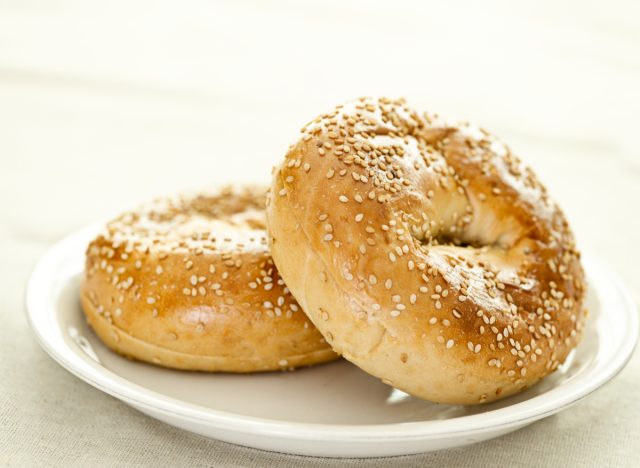Breakfast Habits to Avoid If You Want to Lose Visceral Fat, Say Dietitians

Having a certain amount of body fat is not only normal but totally healthy. But did you know that there are two types of fat, and they can impact your health in different ways? It's true: not all fat is created equal. Subcutaneous fat, which is stored right underneath the skin (think: the stuff you can pinch with your fingers), typically makes up about 90% of your total body fat. The other 10% is visceral fat, which is stored much deeper—under the abdominal wall and in the spaces between and surrounding your organs.
Even in small amounts, this type of fat can do some serious damage. According to Harvard Health, visceral fat produces more cytokines, a particular type of proteins that can trigger inflammation—which increases your risk of certain chronic conditions, like heart disease.
"Visceral fat is carried at the front of the body where it creates a significant stress on the heart and other vital organs," says Trista Best, RD at Balance One Supplements. "If allowed to persist it will form around organs and tissues which makes it difficult to lose, also increasing the risk of chronic disease."
And don't think just because you're at a healthy weight you're off the hook: Visceral belly fat can be a hidden danger even for those who are otherwise slender, according to Best. Harvard Medical School reports that if you're a man with a waist circumference over 40 inches or a woman with a waist circumference over 35 inches, you're at high risk of excess visceral fat.
Fortunately, experts agree that adjusting your breakfast habits can help you shed visceral fat so you can look and feel your best. For example, it's a good idea to avoid trans fats, which are in many processed foods, as research has shown that it can increase visceral fat.
Below, registered dietitians share more breakfast habits to break if you want to lose visceral fat. Then, don't forget to check out more expert-approved tips on How To Reverse Visceral Fat!
Starting your day with sugar.

Before you grab one of those donuts from the conference room or grab a muffin on the way to work, consider this: starting your day with something sweet is one of the worst breakfast habits you can have, because simple sugars like fructose-sweetened foods and beverages can promote belly fat.
"Unfortunately, many of our staple breakfast foods are highly processed convenience options—add to this a coffee loaded with added sugars, and your blood sugars will be off the charts in no time," says Kayla Girgen, RD, founder of Nutrition Untapped. "Following this is the ever-dreaded sugar crash and second round of mid-morning munchies. Limit processed foods and added sugars early on to help with appetite control later in the day."
Lauren Harris-Pincus, MS, RDN—author of The Protein-Packed Breakfast Club, adds that one of the sneakiest sources of sugar at breakfast is coffee. Some fancy coffee drinks can contain upwards of 500 calories and three days' worth of added sugar, according to Harris-Pincus.
"Keep it simple and enjoy your coffee with a natural zero-calorie sweetener and milk or non-dairy milk," she says.
Skipping veggies.

Gabrielle McPherson, MS, RDN, a nutrition specialist at Health Canal, says neglecting to incorporate veggies at breakfast time is a big mistake.
A 2019 study in Nutrients identified several micronutrients abundant in vegetables that can actually have suppressive effects against the accumulation of visceral fat: soluble fiber, manganese, potassium, magnesium, vitamin K, folic acid, and pantothenic acid.
Not sure how to sneak those veggies in? McPherson advises adding some spinach or kale to a smoothie, or tossing mushrooms, tomatoes, peppers, or onions into egg scrambles and omelets.
Drinking too much coffee.

If you're someone who depends on that second, third, or fourth cup of java to fuel you through your workday, listen up: overdoing it on the caffeinated drinks can not only make you jittery but also potentially promote visceral fat.
"While a serving of coffee or tea can give someone a dose of energy in the morning, excess amounts can spike the cortisol, the stress hormone," says Victoria Coglianese, RD. "Too much cortisol over time signals your body to store visceral fat."
Try to stick to one cup of coffee in the morning, says Coglianese, and then reach for less caffeinated alternatives like unsweetened iced tea when you need another mid-morning boost.
Falling short on fiber.

"95% of Americans miss the mark on the 25 to 38 grams of fiber recommended per day," says Harris-Pincus.
So, why is this a problem? Jinan Banna, PhD, RD and professor of nutrition, points out that when you don't get enough fiber in the morning, you don't stay full for very long. That increases the likelihood that you'll reach for potentially unhealthy snacks that promote visceral fat once those inevitable hunger pangs kick in.
Soluble fiber, in particular, helps slow down the movement of food from the stomach to the intestines so you stay fuller for longer. And a 2012 study in Obesity found that increasing daily soluble fiber intake by 10 grams reduced the risk of gaining visceral fat by up to 3.7%.
"Resistant starch, a type of fiber, particularly assists with reducing visceral fat storage because it makes your cells more responsive to insulin, which prevents weight gain around the midsection," says Kara Landau, RD, the founder of Uplift Food.
Harris-Pincus advises aiming for at least 8 to 10 grams of fiber to jumpstart your day and focusing on high-fiber foods like oats, flaxseed, pears, berries, apples, beans, and avocados.
"Green banana flour is one of the world's richest sources of gut-healthy prebiotic resistant starch," adds Landau. "It can be added into a nourishing smoothie or oatmeal bowl, or even blended in with your coffee."
Eating carbs without protein.

"Protein will help to blunt a rise in blood sugar after your meal and keep you full for hours which can be helpful when trying to lose belly fat," says Harris-Pincus.
A 2012 study in Nutrition & Metabolism showed that increased protein intake was associated with reduced abdominal fat.
Eating protein is especially crucial, though, when you're having carbs at breakfast time.
"Eating even a moderate amount of carbs with no protein can spike blood sugar, which can lead to weight gain especially in the abdominal area," says Coglianese. "Protein and fiber help to prevent these spikes. Common mistakes may include neglecting to include a protein source in your oatmeal or fruit smoothie, or just having toast or a bagel in the morning."
To avoid this issue, Coglianese recommends seeking out protein-rich foods like Greek yogurt, cottage cheese, eggs, nuts, and seeds to have alongside carbohydrates.
And if you know you have excess visceral fat that's cause for health concerns, you may just want to lower your carb count overall. A 2015 study in Metabolism found that a decrease in carbohydrate intake was significantly associated with visceral fat loss for men specifically.
For even more breakfast tips, read these next:








